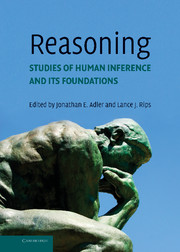38 - The Social Context of Reasoning: Conversational Inference and Rational Judgment
Published online by Cambridge University Press: 05 June 2012
Summary
Most psychologists conceive of judgment and reasoning as cognitive processes, which go on “in the head” and involve intrapsychic information processing (e.g., Kahneman, Slovic, and Tversky, 1982; Nisbett and Ross, 1980). Although it is incontestable that processes of attention, memory, and inference underpin judgment and reasoning, psychologists have perhaps overlooked the extent to which these mental processes are governed by higher-level assumptions about the social context of the information to be processed. On the other hand, philosophers have in recent years drawn attention to the extent to which reasoning from ordinary language is shaped by the nature of social interaction and conversation (Austin, 1962; Grice, 1975; Hart and Honoré, 1959/1985; Mackie, 1974; Searle, 1969; Strawson, 1952). These higher-level assumptions can determine what we attend to, which memories we search, and what kinds of inference we draw.
Consider the way the word family can be differentially interpreted according to context and thus lead to seemingly inconsistent judgments expressed in a conversational exchange (cf. Strack, Martin, and Schwarz, 1988):
Q. How is your family?
A. Fairly well, thank you.
A married man might reply this way if he considers that his wife has recently been saddened by the loss of a close friend but that his two children are in good form. The respondent interprets family to mean the wife and kids.
Information
- Type
- Chapter
- Information
- ReasoningStudies of Human Inference and its Foundations, pp. 774 - 806Publisher: Cambridge University PressPrint publication year: 2008
